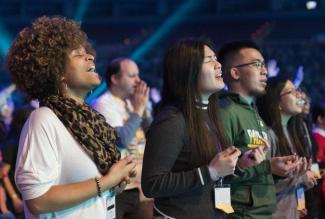How InterVarsity Pursues a Biblical Vision for Racial & Ethnic Reconciliation

As a ministry, InterVarsity longs to see students and faculty pressing into their calling: following Jesus as Savior and Lord, and growing in love for God, God’s Word, God’s people of every ethnicity and culture, and God’s purposes in the world. We know that cultivating these four key loves is a lifelong journey, one where scriptural truths and frameworks ultimately shape how we live on campus, in our homes, communities, and churches.
And as we consider one of the core tenets of our faith, that Jesus’ work on the cross reconciles us both to God and others (Eph 2:14–17), we see this as the foundation for biblical reconciliation. Jesus, and Jesus alone, is the basis for the unity that we believe already exists among God’s people of every ethnicity and culture.
Pursuing Day-to-day Unity
Unfortunately, the Church has always struggled with how to live out that already-accomplished unity. During the writing of the New Testament, the Church struggled—and often failed—to unite Jews and Gentiles in worship together. Those struggles provoked the Council of Jerusalem in Acts 15, Paul’s conflict with Peter in Galatia, and Paul’s letters to Galatia and Rome. The early church knew, as we do, that Christ reconciled people to each other. They knew that one day, we would worship our triune God in a community comprised of every people, nation, tribe, and language (Rev 7:9). But they still had to apply what they knew. They still had to work out what it would look like day-to-day, just like us.
Some may argue that focusing on how to live into reconciliation is a denial of God’s grace. It isn’t. It’s a response to God’s grace. (In a similar vein, marriage counseling isn’t a denial that God has united a man and woman. It’s an attempt to help a married couple live into the reality of their God-given unity.) Similarly, InterVarsity attempts to help ethnically diverse groups of students press into their God-given unity.
We long to cast a biblical vision for what a biblically reconciled community could look like, where all are welcome, all are valued, and all our ethnicities and gifts contribute to the beauty of the whole. But why do we focus on ethnic identity as a doorway to reconciliation? Because we see the ways that people of every ethnic background––including many in White communities––feel demeaned, marginalized, or attacked in our culture. And people who feel that way often are unable to press into reconciliation. So we strive to reset the conversation around what Scripture says about us as ethnic people, particularly in a season where cultural narratives tend to diminish, demean, or demonize ethnic cultures.
We’re created in God’s image (Gen 1:26–7) and are worthy of dignity and respect. God’s creation mandate to be fruitful and fill the earth (Gen 9:7) resulted in the formation of nations and languages (Gen 10), and that resulting ethnic diversity eventuates in a reconciled humanity who remains ethnically and linguistically distinct at the end of time, to God’s glory (Rom 7:9), through Christ’s atoning work (Eph 2:14–17). Those diverse communities will bring their most distinctive features and gifts to God as acts of worship (Is 60:4–9 ; Rev 21:26), demonstrating that our God is the God of all peoples—not some tribal deity. That’s why we celebrate ethnic diversity and identities. Ethnic diversity is God-given, can be God-redeemed, and will be God-honoring, particularly when we confess sins endemic to our cultures (e.g., Neh 1:6–7; Dan 9:7–11; Is 6:5; Rev 18).
Celebrating God-given Differences
Given this larger scriptural perspective, we believe that true unity doesn’t mean we ignore differences. We make space for them—and even celebrate them. Paul says that there is no longer male or female in Christ (Gal 3:28), but we agree that specific Bible studies for men and women should continue. They give us unique opportunities to discern the gifts and sins we experience as gendered beings.
Paul similarly says that there is no longer Jew or Gentile in Christ, but he still made ethnic distinctions in his ministry. He was comfortable noting that he was the apostle to the Gentiles while Peter was the apostle to the Jews (Gal 2:8–10) so that each could contextualize the Gospel to those cultures (compare Peter’s Old Testament saturated sermon in Acts 2 with Paul’s sermon to pagan Athenians in Acts 17). He argued vociferously that Gentiles didn’t need to become Jews to follow Jesus while emphasizing the essential unity that we both treasure. InterVarsity is following in that same tradition.
Our emphasis on race and ethnicity in part stems from a value for discipleship and mission. Fifty-two percent of all college students are people of color. Students all over the country are struggling with questions about racial injustice and inequity. Most of them are not asking what biblical reconciliation and justice might look like. This is why we intentionally create spaces to give students the chance to consider these issues in light of God’s Word, to ask: “How do we live reconciled lives? What responsibility do we have to one another? How can our lives be testimonies to the reconciling work of Jesus?”
As we study the Bible, we invite students to carefully read the text, considering its message for its original audience, and then ask, “How should we apply the truth of this text?” This practice is core to InterVarsity because we believe in the entire trustworthiness and authority of the Bible. It’s this high view of Scripture, along with our love for students and faculty, that compels us to confidently engage with the pressing questions being raised on campuses and in our broader culture today.
Ultimately holding discussions about how Jesus’ atoning work affects race and ethnicity is just one of the many ways we’re equipping students to engage with Scripture and culture. We spend considerable time training students in Scripture study, evangelism, prayer, and global mission. And we desire that all our on campus activities equip students to invite their friends to follow Jesus as Savior and Lord. We host many events aimed at this goal, making thousands of calls to faith every year.
May we, as brothers and sisters in Christ, all strive to grow in love for God, God’s Word, God’s people of every ethnicity and culture, and God’s purposes in the world!







